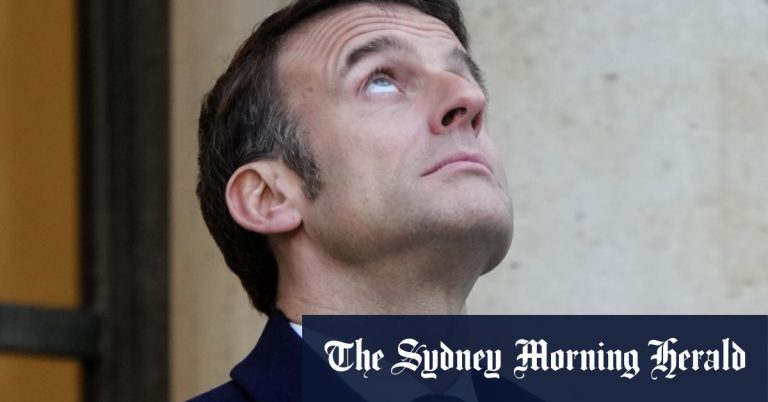With Macron appearing increasingly isolated and opposition politicians in France strongly criticizing his proposal, his government then sought to clarify his comments.
French Defense Minister Sebastien Lecornu said there had been discussions but no consensus had been reached at the conference on carrying out mine clearance operations and military training in Ukraine, away from the front lines.
The minister said: “It is not sending forces to wage war against Russia.”

Civilians take part in Kiev Regional Defense Unit training in a forest in Ukraine in January.credit: Getty Images
The idea of sending troops was taboo, especially as NATO sought to avoid being drawn into a wider war with nuclear-armed Russia. Nothing prevents NATO members from joining such a project individually or in groups, but the organization itself will participate only if all 31 members agree.
NATO Secretary General Jens Stoltenberg said that NATO allies are providing unprecedented support to Ukraine. We have been doing this since 2014 and intensified our efforts after the large-scale invasion. “But there are no plans to deploy NATO combat forces on the ground in Ukraine.”
At a meeting in Prague, Polish Prime Minister Donald Tusk said, “Poland does not plan to send its forces to Ukraine.” Czech Republic Prime Minister Peter Fiala insisted that his country “certainly does not want to send its soldiers.”

Donald Tusk.credit: AP
Slovak Prime Minister Robert Fico said his government does not plan to propose deploying forces, but some countries are considering whether to conclude bilateral agreements to provide forces to help Ukraine repel the Russian invasion.
Fico did not provide details about the countries or what the forces would do in Ukraine. Macron also avoided naming any countries, saying he wanted to maintain “strategic ambiguity” and not raise the West's hand to Russia.
NATO as an alliance provides Ukraine only non-lethal aid and support such as medical supplies, uniforms and winter equipment, but some members send weapons and ammunition on their own, bilaterally or in groups.
download
Deciding to send forces and keep them deployed over the long term will require the kind of transportation and logistics capabilities that only countries like the United States, the United Kingdom, France, Germany, and perhaps Italy, Poland, and Spain can muster.
While Stoltenberg ruled out NATO military action, he told the Associated Press: “This is an aggressive war waged by Russia against Ukraine, in flagrant violation of international law.” According to international law, Ukraine of course has the right to self-defense, and we have the right to support them in defending this right.
The conference was held in Paris after France, Germany and the UK signed 10-year bilateral security agreements with Ukraine, whose government is working to shore up Western support.
European countries are concerned that the United States will reduce its support, due to the suspension of aid to Ukraine in Congress. They also have concerns about the possibility of former President Donald Trump returning to the White House and changing the course of American policy on the continent.
But participants in the meeting said that several European countries, including France, expressed support for an initiative launched by the Czech Republic to purchase ammunition shells for Ukraine outside the European Union. Macron said that a new coalition will be formed to launch medium- and long-range missiles.
In an interview last week, Stoltenberg did not oppose the idea of allowing Ukraine to use Western weapons to strike targets in Russia. Some countries have imposed restrictions on the use of the equipment they provide, requiring it to be used only within Ukraine.
“It is up to each ally to decide whether there are some caveats about what they offer,” Stoltenberg told Radio Free Europe. But he said Ukraine's right to self-defense “also includes striking legitimate military targets, Russian military targets, outside Ukraine.”
AP

